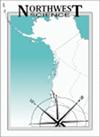Seasonal Catch Rates of the Endemic Olympic Mudminnow in Wetland Habitat
IF 0.5
4区 环境科学与生态学
Q4 ECOLOGY
引用次数: 1
Abstract
Abstract The Olympic mudminnow (Novumbra hubbsi) is a small freshwater fish, endemic to western Washington State. Although the species is listed as a Washington sensitive species, the lack of routine monitoring has resulted in poor understanding of population dynamics over time needed to support management and conservation actions. Olympic mudminnow commonly live in wetlands and associated low-gradient channels with tannic water and soft substrates, making conventional electrofishing and seine sampling approaches challenging and potentially inaccurate. Alternatively, minnow traps can easily be set in a wide range of depths and habitat types and allow for more systematic, repeated sampling. The study purpose was to conduct monthly surveys over a 19-month period to help develop standardized sampling methods. Sampling using baited Gee minnow traps set overnight was conducted in a wetland complex that flows into Eld Inlet in south Puget Sound, Washington. Catch rates of Olympic mudminnow were highest in late summer to early autumn (August through November) when water depths were low and water temperatures were decreasing. Trap mortality was relatively low for both Olympic mudminnow and amphibians but increased during warm spring and summer months. Eighty percent of the Olympic mudminnow captured were between 44 and 56 mm total length, and there was no difference in size between males and females. Gravid females were observed from October to June. Overall, minnow trapping appeared to be an effective method for monitoring Olympic mudminnow populations year round; however, sampling in the autumn appears to be advantageous because catch rates were high, and mortality was low.湿地生境中特有的奥运泥鱼的季节捕获率
奥林匹克泥米诺(Novumbra hubbsi)是华盛顿州西部特有的一种小型淡水鱼。尽管该物种被列为华盛顿敏感物种,但缺乏常规监测导致对种群动态的了解不足,这是支持管理和保护行动所必需的。奥林匹克泥米诺通常生活在湿地和与单宁水和软底物相关的低梯度通道中,这使得传统的电钓和围网取样方法具有挑战性,而且可能不准确。另外,鲦鱼陷阱可以很容易地设置在大范围的深度和栖息地类型,并允许更系统,重复采样。研究的目的是在19个月的时间里进行月度调查,以帮助制定标准化的抽样方法。在华盛顿州普吉特海湾南部流入Eld Inlet的一个湿地综合体中,使用带饵的吉米诺鱼陷阱进行了夜间采样。夏末至初秋(8月至11月)水深较低,水温下降,青鳉的渔获率最高。奥氏泥鳅和两栖类的陷阱死亡率都相对较低,但在温暖的春夏季增加。80%捕获的奥林匹克泥米诺的总长度在44到56毫米之间,雌雄之间的大小没有差异。10 - 6月为妊娠期。总体而言,捕鲦鱼似乎是一种有效的方法来监测奥林匹克泥鳅种群全年;然而,在秋季取样似乎是有利的,因为捕获率高,死亡率低。
本文章由计算机程序翻译,如有差异,请以英文原文为准。
求助全文
约1分钟内获得全文
求助全文
来源期刊

Northwest Science
环境科学-生态学
CiteScore
1.30
自引率
0.00%
发文量
23
审稿时长
>36 weeks
期刊介绍:
The pages of Northwest Science are open to original and fundamental research in the basic, applied, and social sciences. All submissions are refereed by at least two qualified peer reviewers. Papers are welcome from authors outside of the Pacific Northwest if the topic is suitable to our regional audience.
 求助内容:
求助内容: 应助结果提醒方式:
应助结果提醒方式:


